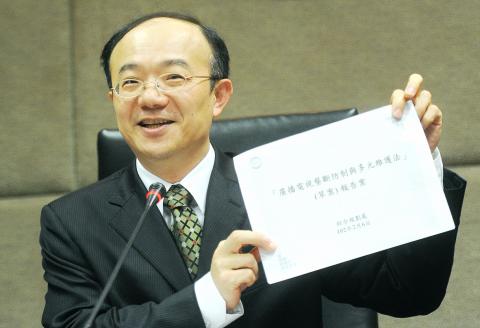An act to prevent monopolization of the media, proposed by the National Communications Commission (NCC), would require media companies to file an application for a merger to proceed if the matter involves mergers in the broadcasting and print media sector, while the commission would not approve any case in which the media ownership concentration level has reached a specified “ceiling.”
The commission yesterday unveiled the general legal framework of the act, which was titled “The broadcasting media monopolization prevention and diversity preservation act (廣播電視壟斷防制與多元維護法).”
Commission chairperson Howard Shyr (石世豪) said that members of the commission have yet to discuss each article in the act, adding that they would decide when the topic would be listed on their agenda the week after the Lunar New Year holiday.

Photo: Liu Hsin-de, Taipei Times
“Each commissioner has been given a stack of materials about the draft act to read over the holiday,” Shyr said.
Based on Shyr’s presentation, the legislation would tackle monopolization of the media and its negative influence on society through four different aspects: regulating media ownership concentration and cross-media monopolization; preserving the professionalism and independence of news media; facilitating the development of diverse cultures and citizens’ autonomy; and facilitating laws under the jurisdiction of other government agencies.
Shyr said that the commission plans to adopt four different levels to regulate media ownership concentration and cross-media ownership. If the broadcasting media merge among themselves and have any change in management or operations, they would be obligated to file an application for the merger with the commission. The legislation would also regulate mergers in the broadcasting and print media sector.
“However, the commission cannot regulate mergers of newspapers, because the commission is not the administrative agency in charge of newspapers,” Shyr said.
Though a certain merger case might endanger the public interest, Shyr said that the commission might still approve it by adding conditional clauses and ensuring that the parties involved in the case fulfill those clauses.
If the commission ascertains that a merger will definitely jeopardize the public interest and would not lead to normal market development, the government would in principle not approve it, Shyr said.
“The only exception would be that the parties in the mergers agree to the terms set by the commission and be willing to subject themselves to the commission’s follow-up supervision and regulations,” he added.
If a merger would cause the level of media ownership concentration to hit a set ceiling, Shyr said that there would be no need for the commission to investigate the facts of the deal and such a deal would be rejected unconditionally.
“The ‘ceiling’ we will set down will be very specific and will not be bent to accommodate different individual cases,” he said.
Meanwhile, Shyr said that the commission would make sure that the proposed act would complement relevant laws in other government agencies.
The act, he said, would require that broadcast media present information about their operations to the commission to help it make informed decisions on cases.

Taiwan would welcome the return of Honduras as a diplomatic ally if its next president decides to make such a move, Minister of Foreign Affairs Lin Chia-lung (林佳龍) said yesterday. “Of course, we would welcome Honduras if they want to restore diplomatic ties with Taiwan after their elections,” Lin said at a meeting of the legislature’s Foreign Affairs and National Defense Committee, when asked to comment on statements made by two of the three Honduran presidential candidates during the presidential campaign in the Central American country. Taiwan is paying close attention to the region as a whole in the wake of a

President William Lai (賴清德) has appointed former vice president Chen Chien-jen (陳建仁) to attend the late Pope Francis’ funeral at the Vatican City on Saturday on his behalf, the Ministry of Foreign Affairs said today. The Holy See announced Francis’ funeral would take place on Saturday at 10am in St Peter’s Square. The ministry expressed condolences over Francis’ passing and said that Chen would represent Taiwan at the funeral and offer condolences in person. Taiwan and the Vatican have a long-standing and close diplomatic relationship, the ministry said. Both sides agreed to have Chen represent Taiwan at the funeral, given his Catholic identity and

Chinese Nationalist Party (KMT) Chairman Eric Chu (朱立倫), spokeswoman Yang Chih-yu (楊智伃) and Legislator Hsieh Lung-chieh (謝龍介) would be summoned by police for questioning for leading an illegal assembly on Thursday evening last week, Minister of the Interior Liu Shyh-fang (劉世芳) said today. The three KMT officials led an assembly outside the Taipei City Prosecutors’ Office, a restricted area where public assembly is not allowed, protesting the questioning of several KMT staff and searches of KMT headquarters and offices in a recall petition forgery case. Chu, Yang and Hsieh are all suspected of contravening the Assembly and Parade Act (集會遊行法) by holding

Lawmakers from the Democratic Progressive Party (DPP) yesterday established a friendship group with their counterparts in Ukraine to promote parliamentary exchanges between the two countries. A ceremony in Taipei for the Taiwan-Ukraine Parliamentary Friendship Association, initiated by DPP Legislator Chen Kuan-ting (陳冠廷), was attended by lawmakers and officials, including Deputy Minister of Foreign Affairs Francois Wu (吳志中) and European Economic and Trade Office in Taiwan Director Lutz Gullner. The increasingly dire situation in Ukraine is a global concern, and Taiwan cannot turn its back when the latter is in need of help, as the two countries share many common values and interests,